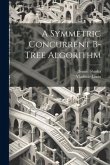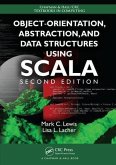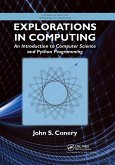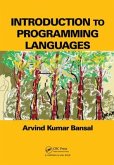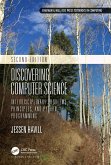- Broschiertes Buch
- Merkliste
- Auf die Merkliste
- Bewerten Bewerten
- Teilen
- Produkt teilen
- Produkterinnerung
- Produkterinnerung
The Art of Algorithm design is a complementary perception of all books on Algorithm design and is a roadmap for all levels of learners as well as professionals dealing with algorithmic problems. It cover the topic in considerable depth, yet makes their design and analysis accessible to all levels of readers.
Andere Kunden interessierten sich auch für
![A Symmetric Concurrent B-tree Algorithm A Symmetric Concurrent B-tree Algorithm]() Vladimir LaninA Symmetric Concurrent B-tree Algorithm16,99 €
Vladimir LaninA Symmetric Concurrent B-tree Algorithm16,99 €![Algorithm of Life. Algorithm of Life.]() Laurel HortonAlgorithm of Life.15,99 €
Laurel HortonAlgorithm of Life.15,99 €![Object-Orientation, Abstraction, and Data Structures Using Scala Object-Orientation, Abstraction, and Data Structures Using Scala]() Mark C LewisObject-Orientation, Abstraction, and Data Structures Using Scala138,99 €
Mark C LewisObject-Orientation, Abstraction, and Data Structures Using Scala138,99 €![Explorations in Computing Explorations in Computing]() John S ConeryExplorations in Computing69,99 €
John S ConeryExplorations in Computing69,99 €![Introduction to Programming Languages Introduction to Programming Languages]() Arvind Kumar BansalIntroduction to Programming Languages126,99 €
Arvind Kumar BansalIntroduction to Programming Languages126,99 €![Discovering Computer Science Discovering Computer Science]() Jessen HavillDiscovering Computer Science110,99 €
Jessen HavillDiscovering Computer Science110,99 €![Spatial Gems, Volume 1 Spatial Gems, Volume 1]() Spatial Gems, Volume 155,99 €
Spatial Gems, Volume 155,99 €-
-
-
The Art of Algorithm design is a complementary perception of all books on Algorithm design and is a roadmap for all levels of learners as well as professionals dealing with algorithmic problems. It cover the topic in considerable depth, yet makes their design and analysis accessible to all levels of readers.
Hinweis: Dieser Artikel kann nur an eine deutsche Lieferadresse ausgeliefert werden.
Hinweis: Dieser Artikel kann nur an eine deutsche Lieferadresse ausgeliefert werden.
Produktdetails
- Produktdetails
- Verlag: CRC Press
- Seitenzahl: 298
- Erscheinungstermin: 4. Oktober 2024
- Englisch
- Abmessung: 229mm x 152mm x 17mm
- Gewicht: 431g
- ISBN-13: 9780367555269
- ISBN-10: 0367555263
- Artikelnr.: 71557204
- Herstellerkennzeichnung
- Libri GmbH
- Europaallee 1
- 36244 Bad Hersfeld
- gpsr@libri.de
- Verlag: CRC Press
- Seitenzahl: 298
- Erscheinungstermin: 4. Oktober 2024
- Englisch
- Abmessung: 229mm x 152mm x 17mm
- Gewicht: 431g
- ISBN-13: 9780367555269
- ISBN-10: 0367555263
- Artikelnr.: 71557204
- Herstellerkennzeichnung
- Libri GmbH
- Europaallee 1
- 36244 Bad Hersfeld
- gpsr@libri.de
Dr.Sachi Nandan Mohanty, received his Postdoc from IIT Kanpur in the year 2019 and Ph.D. from IIT Kharagpur in the year 2015, with MHRD scholarship from Govt of India. He has recently joined as Associate Professor in the Department of Computer Science & Engineering at ICFAI Foundation for Higher Education Hyderabad. Prof. Mohanty research areas include Data mining, Big Data Analysis, Cognitive Science, Fuzzy Decision Making, Brain-Computer Interface, and Computational Intelligence. Prof. S N Mohanty has received 3 Best Paper Awards during his Ph.D at IIT Kharagpur from International Conference at Benjing, China, and the other at International Conference on Soft Computing Applications organized by IIT Rookee in the year 2013. He has published 20 research articles in SCI Journals. As a Fellow on Indian Society Technical Education (ISTE), The Institute of Engineering and Technology (IET), Computer Society of India (CSI), Member of Institute of Engineers and IEEE Computer Society, he is actively involved in the activities of the Professional Bodies/Societies. He has been bestowed with several awards which include "Best Researcher Award from Biju Pattnaik University of Technology in 2019","Best Thesis Award(first Prize) from Computer Society of India in 2015", "Outstanding Faculty in Engineering Award" from Dept. of Higher Education, Govt. of Odisha in 2020. He has received International Travel fund from, SERB, Dept of Science and Technology, Govt. of India for chair the session international conferences USA in 2020. Currently he is the reviewer of various journals and published books with several publishers. Mr. Pabitra Kumar Tripathy completed M.Tech in computer science from Berhampur university, Odisha in the year 2009. He also completed M.Sc. in mathematics from Khallikote Autonomous college Berhampur, Odisha in the year 2003. He is currently pursuing his Ph.D in computer science and Engineering at Biju Patnaik University of Technology. He is working as Head of Department in the department of Computer Science and Engineering at Kalam Institute of Technology, Berhampur. He is having 15 years of teaching and academic experience. His area of interest are Computer Graphics, Programming Languages, Algorithms, Theory of computation, Compiler design, Artificial Intelligence. He also have published 5 International journals and 2 Patients. He have published 5 number of books for Graduate students. Dr. Suneeta Satpathy, received her Ph.D. from Utkal University, Bhubaneswar, Odisha, in the year 2015, with Directorate of Forensic Sciences, MHA scholarship from Govt of India. She is currently working as an Associate Professor in the Department of Computer Science & Engineering at College of Engineering Bhubaneswar (CoEB), Bhubaneswar. Her research interests include Computer Forensics, Cyber Security, Data Fusion, Data Mining, Big Data Analysis, Decision Mining and Machine Learning. In addition to research, she has guided many post-graduate and graduate students. She has published papers in many International Journals and conferences in repute. She has two Indian patents in her credit. Her professional activities include roles as editorial board member and/or reviewer of various journals. She is also editor of several books on the topic of Digital Forensics, Internet of Things, Machine Learning and Data Analytics to be published by leading publishers. She is a member of CSI, ISTE, OITS, ACM, IE, and IEEE.
Chapter 1. Fundamental Concepts of Data Structure. Chapter 2. Concepts of
Algorithms and Recurrences. Chapter 3. Divide-and-Conquer Techniques.
Chapter 4. Dynamic Programming. Chapter 5. Greedy Algorithms. Chapter 6.
Graph. Chapter 7. Approximation Algorithms. Chapter 8. Matrix Operations,
Linear Programming, Polynomial and FFT. Chapter 9. Number Theoretic
Algorithms. Chapter 10. Programming Implementations of the Algorithms
Algorithms and Recurrences. Chapter 3. Divide-and-Conquer Techniques.
Chapter 4. Dynamic Programming. Chapter 5. Greedy Algorithms. Chapter 6.
Graph. Chapter 7. Approximation Algorithms. Chapter 8. Matrix Operations,
Linear Programming, Polynomial and FFT. Chapter 9. Number Theoretic
Algorithms. Chapter 10. Programming Implementations of the Algorithms
Chapter 1. Fundamental Concepts of Data Structure. Chapter 2. Concepts of
Algorithms and Recurrences. Chapter 3. Divide-and-Conquer Techniques.
Chapter 4. Dynamic Programming. Chapter 5. Greedy Algorithms. Chapter 6.
Graph. Chapter 7. Approximation Algorithms. Chapter 8. Matrix Operations,
Linear Programming, Polynomial and FFT. Chapter 9. Number Theoretic
Algorithms. Chapter 10. Programming Implementations of the Algorithms
Algorithms and Recurrences. Chapter 3. Divide-and-Conquer Techniques.
Chapter 4. Dynamic Programming. Chapter 5. Greedy Algorithms. Chapter 6.
Graph. Chapter 7. Approximation Algorithms. Chapter 8. Matrix Operations,
Linear Programming, Polynomial and FFT. Chapter 9. Number Theoretic
Algorithms. Chapter 10. Programming Implementations of the Algorithms


